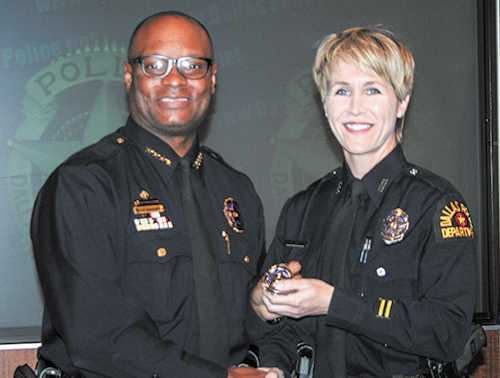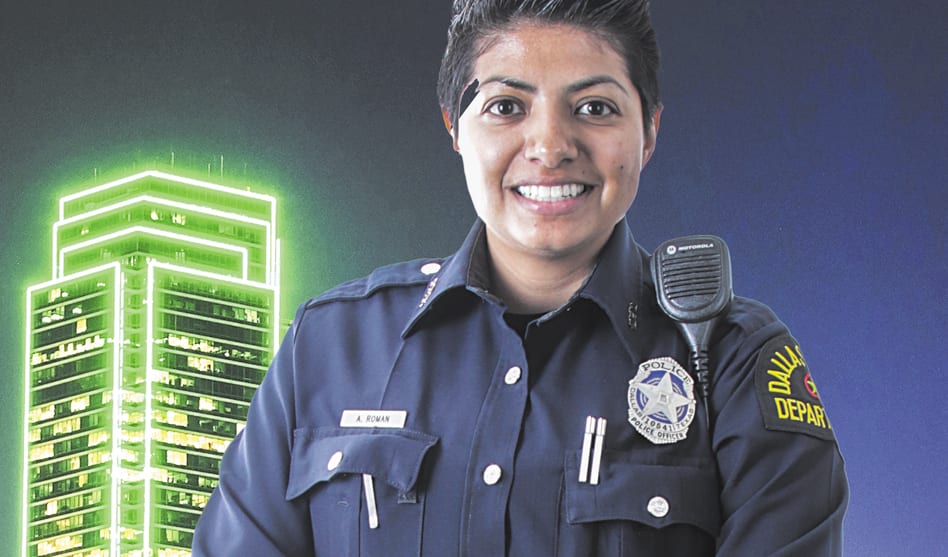Amber Roman replaces Laura Martin as the community’s connection to the police department
DAVID TAFFET | Senior Staff Writer
taffet@dallasvoice.com
When Amber Roman was in the police academy, the Dallas Police Department’s LGBT liaison officer, Laura Martin, spoke to the incoming class of rookies. And as Martin addressed the group, Roman listened and promised herself: “I’m going to be that one day.”
When new Dallas Police Chief Renee Hall did some realigning in the department, Roman got her chance.
Martin’s position as liaison had followed her wherever she went in the department. When she was on bike patrol in East Dallas and later when she was promoted to detective, Martin remained the liaison.
But Hall decided the position needed to be in one place, and that place was the Office of Community Affairs where the Asian, African-American and Latino liaison units are headquartered. For Martin, who recently has been spending quite a bit of her time escorting dignitaries around town — including former First Lady Michelle Obama — that would have been a demotion.
So Martin decided it was time to pass the torch on the liaison position, and Roman is delighted she did. Since Martin’s still on the force, Roman said, she’s been a great mentor for her, helping her figure out how to be the greatest help to the community.
Joining the force
Roman is the youngest of four children and grew up in Oak Cliff. But even being the youngest, “I was never treated like the baby,” she said. “I always had a big mouth.”
She remains close with her family, and when she was married last year to her partner of 10 years, Roman said she had a “traditional” wedding: Her family threw her a bridal shower and were all there as she and her wife were married by a judge in a Dallas courtroom.

Laura Martin, pictured with former Chief David Brown, continues to serve on the Dallas police force, but decided it was time to pass the LGBT liaison torch. (Dallas Voice file photo)
Roman always knew she wanted to do something meaningful with her life, and for awhile in college, she thought she wanted to be a counselor. “I always had a yearning to reach people, to speak to people,” she said.
Her sister, who’s a nurse, suggested she become a police officer. But Roman said she didn’t want to be a cop and write tickets. Still, on a whim, she applied to the Dallas Police Department, was accepted and went to the academy. And, she said, writing tickets has always been her least favorite thing to do.
Roman has spent her first five years on the force doing neighborhood policing. She engaged businesses and neighborhoods by attending crime watch meetings and finding out what the community needs. Among her many activities was a Share the Shoe Drive.
“Lots of kids don’t have a decent pair of shoes,” she said. So she got businesses to donate shoes, and she gave those shoes to local rec centers to distribute.
Roman said she found lots of creative ways to connect with the community she served. She did foot patrols because, she explained, she couldn’t speak to people when she was in a car. She read to kids at the library. At Christmas she collected food and clothing “for people who don’t have access to those things.”
When she was told the liaison position was open and her name was on a short list of candidates, Roman said, “I was speechless and honored I was being considered for the job. When it was offered, I didn’t have the words. It took awhile to sink in.”
She is the first person of color to hold the LGBT community liaison position. “There just aren’t that many Hispanic women on the force,” she said.
In addition to Martin, Roman said a number of people have been inspirations to her. Former Dallas County Sheriff Lupe Valdez is among her heroes. She first met Valdez at the Round-Up Saloon. She said once she got up the courage to walk up to the sheriff and introduce herself, Valdez was delighted to meet her and, she said, was sweet and encouraging.
Lynn Albright, DPD’s first LGBT liaison, is another inspiration, Roman said, because lesbian officers weren’t welcomed to the force with open arms at the time.
Albright was appointed to the liaison position after the city of Dallas lost a lawsuit brought by Mica England in the late 1980s. England had applied to become a Dallas police officer. She was rejected because she was considered a criminal since she violated section 21.06 of the Texas Penal Code that criminalized consensual sexual contact between adults of the same gender.
While the case worked its way through the courts, protesters appeared regularly at Dallas City Council meetings wearing “No Homo Cops” buttons and speaking about preventing gays and lesbians from gaining employment equality. In 1994, after England’s case was settled, the council passed its first non-discrimination ordinance protecting the city’s LGBT employees from discrimination.
To everyone’s surprise, even Mayor Steve Bartlett, a conservative Republican, said before casting his vote for the ordinance, “I don’t discriminate in my business. I don’t see why the city should discriminate.”
While England never did become a DPD officer, her lawsuit paved the way for otherwise qualified LGBT people to join the force, and the city’s then-new police chief, Ben Click, created the liaison position.
Roman said Albright and England were brave women to have done what they did.
On the job as liaison
Since taking over the position less than a month ago, Roman has spent most of her time getting to know the vast number of groups, organizations and institutions within Dallas LGBT community. She also jumped right in to help when a couple was held up in Oak Lawn while walking from a bar on Cedar Springs Road to Maple Avenue.
She said that incident and a similar attack several weeks earlier immediately brought to mind the string of assaults that occurred in the neighborhood about two years ago.
What was most frustrating for everyone about those attacks, Roman said, was that there never was a satisfying Law & Order-type ending. Because the victims who were assaulted from behind and were blindsided when they were hit in the head, there was no usable description of the assailants. Without tangible evidence, no one was arrested for those violent crimes.
But the attacks ended and, during that period, several people were arrested for other crimes.
Roman said the people responsible are probably in jail for other offenses, but police are unable to officially link them to the attacks in Oak Lawn. Roman said that one thing police learned clearly during the months of attacks was that the LGBT community wasn’t going to stand for continual assaults.
“It was on everyone’s radar,” she said.
When Take Back Oak Lawn formed, police noticed. When volunteers stepped up to take police training and do VIP — Volunteers In Patrol — shifts throughout the neighborhood, police noticed and worked with the community groups.
Roman also said she is deeply disturbed by the rampant violence targeting the trans community, and she wants the community to know, “I’m somebody they can believe is on their side.”
Roman said she’s there for people who may not normally be comfortable talking to the police, either because the topic is sensitive or because they feel other officers may judge them because of their sexual orientation or gender identity. Or if someone feels police are ignoring their case or haven’t gotten information back in a timely manner, as liaison, she can assist the community.
Roman can be reached by email at amber.roman@dallascityhall.com.

